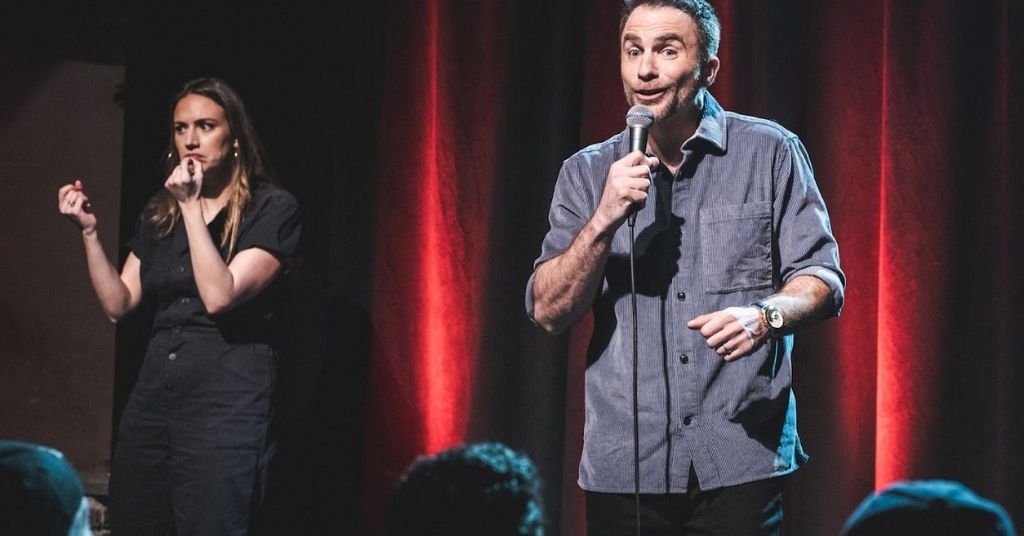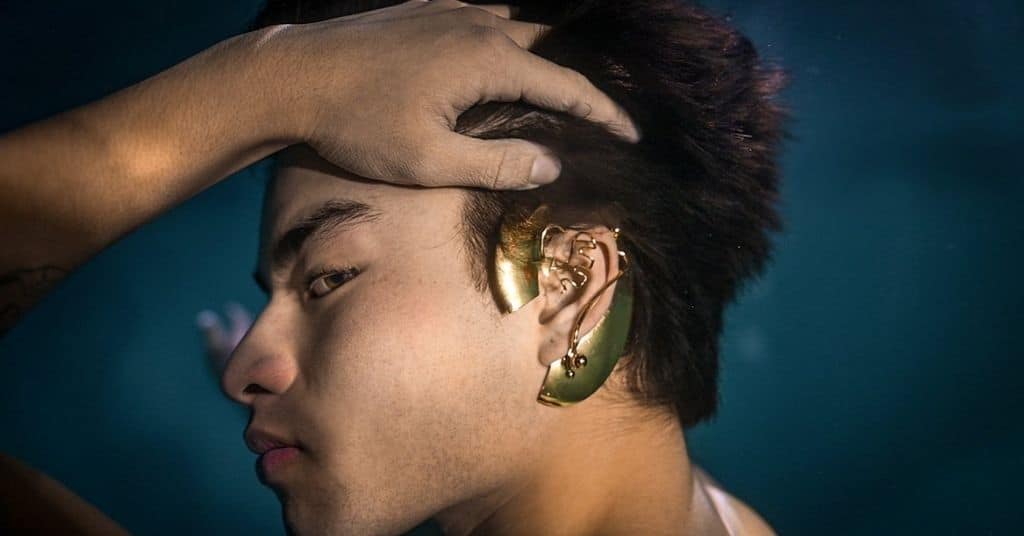
What I remember about being in elementary school with a hearing loss
November 8, 2019
A State-by-State Guide for Hearing Aid Insurance
November 11, 2019Book Review: ‘Emerald City,’ a novel by Brian Birnbaum

PR Hilton reviews “Emerald City” and interviews author Brian Birnbaum. Birnbaum is an only Child of Deaf Adults (CODA), and works in development for his father’s deaf access company. He incorporates the Deaf community into his book.
Book Summary
With his gritty look at the modern crime syndicate, Brian Birnbaum delves into corporate fraud, drug gangs, and the Deaf community in his literary fiction title, “Emerald City.”
Drawing inspiration from his experience as a Child of Deaf Adults (CODA) and the Video Relay Service fraud that ran rampant throughout the early 2000s, Birnbaum dissects the impact of crime, addiction, and psychological trauma through interconnecting storylines.
Set in Seattle, “Emerald City” follows Benison Behrenreich, the “hearing” son of deaf royalty. His father, CEO of a multimillion-dollar deaf access agency, has bribed Myriadal College officials for Benison’s spot on their powerhouse basketball team, where he struggles to prove himself and compensate for his father’s sins.
Julia Paolantonio has recently lost her father to a drug relapse. Her mother ships her off to live with her estranged granddad, Johnny Raciti, during the summer before her freshman year at Myriadal. Johnny offers her a deal: bring him Peter Fosch — a tormented college dropout and the best drug runner west of the Cascades — and he’ll give Julia’s freshly widowed mother a board seat on his mobbed-up securities firm.
When Benison’s father is arrested for defrauding government subsidies for the deaf, the Behrenreichs are left vulnerable to his company’s ruthless backers — namely Johnny Raciti — forcing Julia and Peter to navigate the minefield that’s left.
Book Review: “Emerald City”
“Emerald City” is both a clever literary novel as well as a modern classic crime thriller. Every page pulses with muscular strength and energy. The story may be about corruption, drugs and scandal, but it is the beauty of the written word that draws the reader in.
According to Birnbaum, the book took a long time to write. Perhaps like Hemingway, Birnbaum has removed anything not up to his obviously skyscraper high standard, polishing and carefully crafting what remains.
The book tells its story across a backdrop of realistic cityscapes, populated with the kind of people you will feel you already know. Add to this the coming together of the hearing and the Deaf world and you have a book well worth reading. That said, don’t think this is an easy read, because it is far from that category.
This is no book to snuggle up with at bedtime. You won’t get much sleep, because you will be too busy turning the pages.
Q&A with Author Brian Birnbaum
Author Brian Birnbaum
Brian worked on “Emerald City” for six years, querying countless agents, eager to get his book out into the world. After finding a high-powered agent at Writers House — only to watch that agent slip from the industry altogether — Birnbaum teamed up with Katie Rainey and Jonathan Lee Kay to create a press based in cultivating a creative and supportive community called Dead Rabbits. Initially, a successful reading series, the company continues the spirit of innovation and acceptance built within the reading series to the publishing industry where they strive to support authors.
Birnbaum received his MFA in Fiction from Sarah Lawrence College in 2015. His work has appeared or is forthcoming in Atticus Review, The Smart Set, Potluck Magazine, LUMINA, 3AM Magazine, The Collagist, Anti-Heroin Chic, and more.
I was happy to have the chance to interview him for this article:
HLM: What was your childhood like, growing up as a child of deaf parents?
Birnbaum: I didn’t give much thought to it until I got older. As a kid, teenager, and young adult, when people asked me what it was like, my responses would evade the essence of their question. Sometimes I’d say they were great parents and leave it at that. Sometimes I’d say they were great parents and provided me everything I needed. In effect, I was trying to protect them, to make sure people knew they were great parents, because they were. It wasn’t until I got older that I learned to accept the impact of something that was out of their control.
But, at this point in my life, I believe the benefits far outweighed the negatives. At a very young age I not only learned another language—American Sign Language—but I was also exposed to the stark differences that exist among people, and how to navigate those differences, which imbued me with empathy. Also, in high school, I got away with parties in my basement.
“…I was also exposed to the stark differences that exist among people, and how to navigate those differences, which imbued me with empathy.”
HLM: At college did you associate with any deaf students because of your understanding of the community?
Birnbaum: Yes, but not at the University of Maryland, but with the students and faculty at Gallaudet. First through a Level V ASL class that helped me maintain my skills despite long periods away from the Deaf community, and later on through my work as a writer. I gave a presentation to an undergrad class at GU on starting a small press and the writing process, which was a great experience.
It wasn’t until after college that I truly rediscovered my engagement with the Deaf community, outside my association with my parents’ close friends, which has more or less been consistent throughout my life. During grad school I visited my mom’s college roommate from back in her GU days. [This was the] woman who first taught her to sign, and with whom I practiced signing, once a week.
HLM: As a writer, do you feel obliged to highlight deaf issues or is this a personal choice for you?
Birnbaum: Only in the sense that it’s an indelible element of my experience, and so to ignore it would be to bowdlerize aspects of my being. So I would say both, in a way.
HLM: What made you choose to write a crime novel and were you inspired by any true events?
Birnbaum: I have long been infatuated with organized crime. My favorite movie is Goodfellas. Starting with the Italian crime families, I’ve since researched countless organized crime elements, from the Bostonian opium importation operation that funded American railroads to the laundering of racket-money through cryptocurrency holding companies.
Some of the novel’s crime elements come from indirect experience—i.e. the doings of people I’m aware of, people I’ve even met. My great grandfather was a Dutch Schultz associate. My father knows individuals who were once involved in Video Relay Service (a telephonic/video interpretation service for the Deaf and Hard of Hearing) fraud. He even had to rebuff certain business partnerships based on such operations—he’s a very honest man.
HLM: How would you sum up your mission as a writer?
Birnbaum: I could either write a treatise on the subject or a single sentence—both are entirely insufficient yet overstated at the same time. I’ll attempt at moderation.
First off, I set out to be honest. This starts far before I ever sit down before a blank page. It requires wisdom and experience and, most important, the willingness to face the existential, psychological, and emotional gamut. Without this elemental honesty, I might as well try and make viral YouTube videos.
Then I make sure I’m deriving both fun and fulfilment. Because if I’m not gleaning fun and fulfilment putting words on the page, how can I expect an audience to do so while reading the words on the page? And why the hell would I want to write in the first place? Yes, literature is and in almost all cases should be nutritive—but do we not make our salads enjoyable to eat?
Last—and most certainly not least—I aim to add value to the world. This can come in so many different shapes and forms. No one is the sole arbiter on what constitutes literature that’s ‘good’ for the world. However, this comes back to honesty: am I rationalizing on the page? Am I refining my idea, which is really a process of being able to admit when I’m wrong? Am I showing my work to others, exposing my vulnerability via this literate transcription of my consciousness? Without aspiring to connect my honesty with the world, I really might as well be making viral vids.
HLM: What advice would you give to other children of deaf parents?
Brian: Remember what they’ve been through! Being Deaf is a profoundly difficult experience, no different in its difficulty than that of any other marginalized demographic—except with the added difficulty of lacking one of our only five senses through which we encode and decode the world. There are benefits to this, whether through a heightened awareness of other senses, or a stronger sense of community amid Deaf folks. But lack is lack. It’s important to remember that all Deaf folks are survivors in their own way.
I know it can be frustrating. There’s absolutely nothing wrong with wishing, at times, that you were born to hearing parents. To deny such a feeling would only be dishonest, for we wish for things that we can’t control all the time. But it’s more important to remember the gift of being a CODA, the exposure to difference and empathy, the sensitivity it instills in us, which breeds imagination and creativity. Far beyond imagining what it would be like to live one day without your hearing, it’s an entryway into imaging anything outside your immediate experience. And that’s really what stories are all about.
Have you read Emerald City yet? Let us know what you think!





